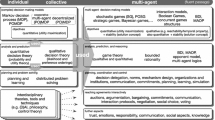Abstract
This article examines the group processes studied in oligopoly theory and in decentralized artificial intelligence. We develop a unifying perspective for the research on the behavior of autonomous interacting agents. Among the many questions of interest in these disciplines are the ways of creating and reaching cooperation by a group of self-interested independent decentralized agents. In this respect, the models and results of oligopoly theory can also be used both in decentralized artificial intelligence and in many other areas of research, such as group decision making, negotiation support, and organizational theory. In particular, the important idea of reshaping goals with strategic information sharing and transmission—incentive communication—has received little attention outside the field of economics. On the other hand, oligopoly theory and experimental economics can especially benefit from the computational methods and tools of artificial intelligence and modern decision support technology. To demonstrate this we have built a prototype of an experimental market analysis environment. Its potential in the analysis of group processes is illustrated with examples.
Similar content being viewed by others
References
BalighH.H.: 1986, “Decision Rules and Transactions, Organizations and Markets”, Management Science 32(11), 1480–1491.
BambergG. and SpremannK., eds.: 1989, Agency Theory, Information, and Incentives, Springer-Verlag, New York.
BaşarT.: 1987, “Relaxation Techniques and Asynchronous Algorithms for On-Line Computation of Non-Cooperative Equilibria”, Journal of Economic Dynamics and Control 11, 531–549.
BertsekasD.P. and TsitsiklisJ.N.: 1991, “Some Aspects of Parallel and Distributed Iterative Algorithms—A Survey”, Automatica 27(1), 3–21.
ConnahD. and WavishP.: 1990, “An Experiment in Cooperation”, in Decentralized A.I., (eds. Y.Demazeau and J.-P.Müller), pp. 197–212, Elsevier Science Publishers, New York.
DaughetyA.F., ed.: 1988, Cournot Oligopoly: Characterization and Applications, Cambridge University Press, New York.
DemazeauY. and MüllerJ.-P., eds.: 1990, “Decentralized Artificial Intelligence”, in pp. 3–13, Decentralized A.I., (eds. Y.Demazeau and J.-P.Müller), Elsevier Science Publishers, New York.
Ehtamo, H. and Hämäläinen, R.P.: 1992, A Cooperative Incentive Equilibrium for a Resource Management Problem, Journal of Economic Dynamics and Control. (to appear)
Ehtamo, H., Verkama, M. and Hämäläinen, R.P.: 1992, “On Contracting under Incomplete Information Using Linear Proposals”, in proceedings of the Fifth International Symposium on Dynamic Games and Applications, Grimentz, Switzerland. (to appear)
FoxM.S.: 1981, “An Organizational View of Distributed Systems”, IEEE Transactions on Systems, Man, and Cybernetics 11(1), 70–80.
FriedmanJ.W.: 1990, Game Theory with Applications to Economics, 2nd ed., Oxford University Press, New York.
FudenbergD. and TiroleJ.: 1991, Game Theory, The MIT Press, Cambridge MA.
GasserL. and HuhnsM.N., eds.: 1989, Distributed Artificial Intelligence, Vol. II, Morgan Kauffmann Publishers, San Mateo, CA.
GinsbergM.L.: 1987, “Decision Procedures”, in pp. 3–28, Distributed Artificial Intelligence (ed. M.N.Huhns), Morgan Kaufmann Publishers, San Mateo, CA.
Gmytrasiewicz, P.J., Durfee, E.H. and Wehe, D.K.: 1991, “A Decision-Theoretic Approach to Coordinating Multiagent Interactions”, in Proceedings of the Twelfth International Joint Conference on Artificial Intelligence, Sydney, Australia, 62–68.
HoffmanE., MarsdenJ.R., JacobV.S. and WhinstonA.: 1986, “Artificial Intelligence in Economics—Expert Systems Modelling of Microeconomic Systems”, in pp. 1–9, Artificial Intelligence in Economics and Management (ed. L.F.Pau), Elsevier Science Publishers, New York.
HuhnsM.N., ed.: 1987, Distributed Artificial Intelligence, Morgan Kaufmann Publishers, San Mateo, CA.
HämäläinenR.P. and EhtamoH., eds.: 1991a, Differential Games—Developments in Modelling and Computation, Lecture Notes in Control and Information Sciences, Vol. 156, Springer-Verlag, New York.
HämäläinenR.P. and EhtamoH., eds.: 1991b, Dynamic Games in Economic Analysis, Lecture Notes in Control and Information Sciences, Vol. 157, Springer-Verlag, New York.
KalaiE. and StanfordW.: 1985, “Conjectural Variations Strategies in Accelerated Cournot Games”, International Journal of Industrial Organization 3, 133–152.
Kraus, S. and Wilkenfeld, J.: 1991, “Negotiations Over Time in a Multi-Agent Environment: Preliminary Report”, in Proceedings of the Twelfth International Joint Conference on Artificial Intelligence, Sydney, Australia, 56–61.
MaloneT.W.: 1987, “Modeling Coordination in Organizations and Markets”, Management Science 33(10), 1317–1332.
MaloneT.W. and CrowstonK.: 1991, Toward an Interdisciplinary Theory of Coordination, Technical Report CCS TR# 120 (SS WP# 3294-91-MSA), Center for Coordination Science, MIT, Cambridge, MA.
MillerR.M.: 1986, “Markets as Logic Programs”, in pp. 129–136, Artificial Intelligence in Economics and Management (ed. L.F.Pau), Elsevier Science Publishers, New York.
PauL.F., ed.: 1986, Artificial Intelligence in Economics and Management, Elsevier Science Publishers, New York.
Prietula, M.J., Beauclair, R.A. and Lerch, F.J.: 1990, “A Computational View of Group Problem Solving”, in Proceedings of the 23rd Hawaii International Conference on System Sciences, IEEE Computer Society Press.
SathiA. and FoxM.S.: 1989, “Constraint-Directed Negotiation of Resource Real-locations”, in pp. 163–193, Distributed Artificial Intelligence, Vol. II (ed. L.Gasser and M.N.Huhns), Morgan Kauffmann Publishers, San Mateo, CA.
ShapiroC.: 1989, “Theories of Oligopoly Behavior”, in pp. 329–414. Handbook of Industrial Organization (eds. R.Schmalensee and R.Willig), Elsevier Science Publishers, New York.
SmithV.L., ed.: 1990, Experimental Economics (Schools of thought in economics; v. 7), Edward Elgar Publishing Limited, England.
UlphA.: 1987, “Recent Advances in Oligopoly Theory from a Game Theory Perspective”, Journal of Economic Surveys 1(2), 149–172.
Werner, E.: 1988, “Toward a Theory of Communication and Cooperation for Multiagent Planning”, in Proceedings of the Second Conference on Theoretical Aspects of Reasoning about Knowledge, Pacific Grove, CA, 129–143.
Zlotkin, G. and Rosenschein, J.S.: 1991, “Incomplete Information and Deception in Multi-Agent Negotiation”, in Proceedings of the Twelfth International Joint Conference on Artificial Intelligence, Sydney, Australia, 225–231.
Author information
Authors and Affiliations
Rights and permissions
About this article
Cite this article
Verkama, M., Hämäläinen, R.P. & Ehtamo, H. Multi-agent interaction processes: From oligopoly theory to decentralized artificial intelligence. Group Decision and Negotiation 1, 137–159 (1992). https://doi.org/10.1007/BF00406752
Issue Date:
DOI: https://doi.org/10.1007/BF00406752




